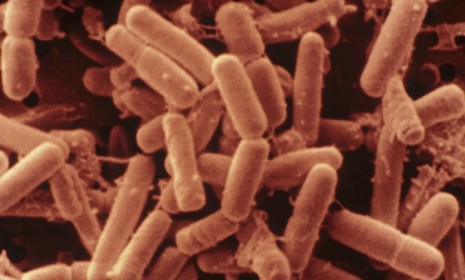The new superbug — and the end of antibiotics
A new "superbug" has the potential to make even the most minor infections untreatable — and it's already in the U.S. How worried should you be?

A free daily email with the biggest news stories of the day – and the best features from TheWeek.com
You are now subscribed
Your newsletter sign-up was successful
A new strain of bacteria has been discovered that is impervious to almost all types of modern antibiotics, says medical journal The Lancet Infectious Diseases, and the government now admits it has already been discovered in American patients. If that news didn't worry you enough, scientists warn that it may herald the end of the era of antibiotics. Here's an instant guide:
What is this "superbug"?
A bacteria that has a resistance factor known, catchily, as "New Delhi metallobetalactamase," or NDM-1 for short. It's actually the resistance factor we should be worried about, not necessarily the bacteria itself. (Watch a CNN report about the spread of the "superbug")
The Week
Escape your echo chamber. Get the facts behind the news, plus analysis from multiple perspectives.

Sign up for The Week's Free Newsletters
From our morning news briefing to a weekly Good News Newsletter, get the best of The Week delivered directly to your inbox.
From our morning news briefing to a weekly Good News Newsletter, get the best of The Week delivered directly to your inbox.
Why should we be worried about NDM-1?
Because of what it does to the bacteria that makes us sick. Modern antibiotics react with the cell membrane of such bacteria to destroy or control them. NDM-1 makes the cell membrane impervious to almost all of the powerful class of antibiotics called carbapenems — considered the drug of last resort for these infections — bringing "common bacteria... to the brink of being untreatable."
Surely doctors can come up with some treatment for it?
Apparently not. "This is potentially the end" of antibiotic treatment, says Tim Walsh, who discovered NDM-1, quoted in Britain's Guardian. "There are no antibiotics in the pipeline" that kill NDM-1. We have a "bleak window of maybe 10 years" where we must ration our existing drugs, but soon we must "grapple with the reality that we have nothing to treat these infections with."
A free daily email with the biggest news stories of the day – and the best features from TheWeek.com
What kind of infections would be untreatable?
Almost all of them, from pneumonia to septicaemia to E-coli. That would make simple operations — for appendicitis, for example — potentially deadly as untreatable bacteria invade the patient's body. Transplant surgery would become impossible, and tuberculosis untreatable. "It has the potential to become an extremely serious global threat," says Maryn McKenna, author of the SuperBug blog.
Why is it named after New Delhi?
It reportedly originated in South Asia, and thrived due to the "liberal non-prescription use of antibiotics" in India. The original Lancet report said that NDM-1's international spread was driven by "medical tourists" using India's cheap, yet sophisticated, health-care system. Doctors in the country have attacked the report, saying it is funded by pharmaceutical companies and designed to take business away from Indian hospitals. Indian officials called it "malicious propaganda."
Is it only found in India, then?
Unfortunately, no. Three Americans returned from India earlier this year infected with the superbug, according to the Center for Disease Control. One was in California, one in Illinois, and another was detected in Massachusetts. All three were contained, and there is no evidence that the bug spread. The bug has also been detected in Pakistan, Sweden, the Netherlands, Australia, and Canada.
Is there anything we can do to combat it?
New antibiotics can buy time, provided drug companies come up with them. In the meantime, says Sarah Boseley in the Guardian, "the game now is to keep bacteria at bay." Better cleaning in hospitals, bathrooms, and kitchens will help cut down infections. Beyond that, it's a matter of prolonging the effectiveness of the antibiotics we have. Cutting down on their use will slow the development of bacteria that are resistant to them, although scientists say antibiotic use is so prevalent worldwide that a significant reduction is unlikely.
Is it time to panic?
Not just yet, says Scott Hensley at NPR. Plenty of bacteria already exist that "evade the most common antibiotic bullets" — the "superbug" MRSA, for example, which caused a scare a decade ago. Hygiene has proved to be a successful weapon against that. "Mom was right about washing your hands well and often." Keep it up, and you'll probably be okay.
Sources: The Lancet, Guardian, NPR, Times of India, The SuperBug Blog, Boston Herald
This story was originally published on August 17, 2010 and updated on September 15 of the same year
-
 Local elections 2026: where are they and who is expected to win?
Local elections 2026: where are they and who is expected to win?The Explainer Labour is braced for heavy losses and U-turn on postponing some council elections hasn’t helped the party’s prospects
-
 6 of the world’s most accessible destinations
6 of the world’s most accessible destinationsThe Week Recommends Experience all of Berlin, Singapore and Sydney
-
 How the FCC’s ‘equal time’ rule works
How the FCC’s ‘equal time’ rule worksIn the Spotlight The law is at the heart of the Colbert-CBS conflict